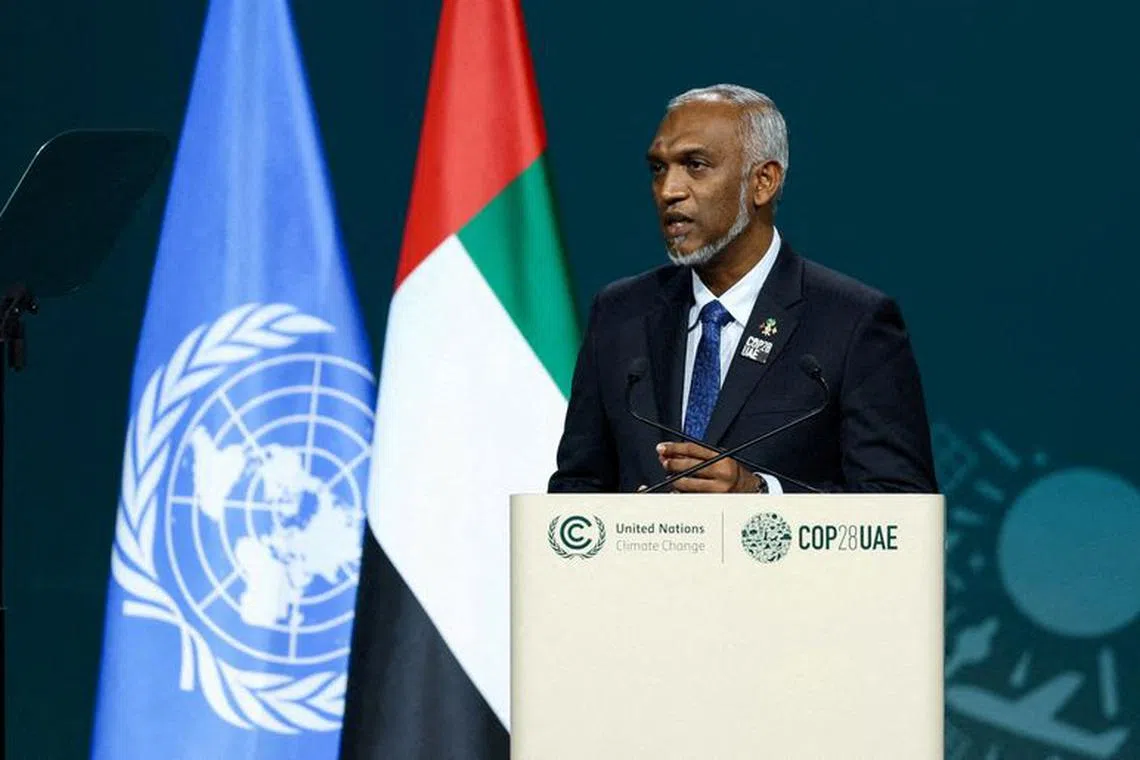Maldives President courts investors in China as ties with India sag
Sign up now: Get insights on Asia's fast-moving developments

Increasing export of fish products to China under the two countries' free trade agreement will be a key priority, Maldivian President Mohamed Muizzu said.
PHOTO: REUTERS
BEIJING – At an Invest Maldives forum in a southern Chinese port city, Maldivian President Mohamed Muizzu shook hands and exchanged words with smiling local officials on a China visit set to deepen bilateral ties as the archipelagic nation pirouettes away from India.
After the forum in Fuzhou on Jan 9, Dr Muizzu and his delegation will meet Chinese President Xi Jinping and Premier Li Qiang in Beijing during his week-long visit, where pacts from infrastructure to tourism are expected to be signed.
Dr Muizzu became president in November after winning on his India Out campaign platform, under which he called New Delhi’s huge influence a threat to sovereignty.
His government has since asked dozens of locally based Indian military personnel to leave. And in an apparent snub to India, Dr Muizzu is in China this week, before any visit to his country’s giant neighbour.
In Fuzhou, the Chinese city designated as the start of China’s maritime Silk Road, Dr Muizzu said China remained one of his country’s “closest allies and developmental partners”, according to a statement released by his office.
Increasing export of fish products to China under the two countries’ free trade agreement will be a key priority, Dr Muizzu added.
Fishing is the largest source of employment in the Maldives, where 99 per cent of its territory comprises the sea. Aquatic products account for more than 98 per cent of exports by volume and value.
China has already built a presence for itself in the Maldives.
Under Mr Xi’s Belt and Road Initiative (BRI) aimed at building a global trade and infrastructure network, China has helped expand the Velana International Airport in Male and built the cross-sea China-Maldives Friendship Bridge.
Dr Muizzu said his government was keen to explore partnerships under Belt and Road, including the expansion of the country’s central airport and commercial port.
Chinese firms have invested US$1.37 billion (S$1.82 billion) in the Maldives since its decision to join the BRI in 2014, data from the American Enterprise Institute think-tank shows.
In 2023, China National Machinery Industry Corp invested US$140 million in the Maldives’ tourism sector, which accounts for more than a quarter of the country’s national income.
In 2019, Chinese tourists represented 19.7 per cent of foreign visitors, making them the biggest tourist group, although they slipped to third position by 2022 during the Covid-19 pandemic.
‘Nervousness’
The Maldives is also a popular destination among Indians, whose presence has grown more prominent in the three years when China’s austere pandemic restrictions kept Chinese visitors away.
In the latest sign of sagging ties between the two neighbours, #ExploreIndianIslands has become a trending hashtag in India, as some Indians share screenshots of cancelled bookings of Maldivian holidays on X, formerly Twitter.
Indian Prime Minister Narendra Modi himself was snorkelling last week in Lakshadweep, an archipelago of atolls and reefs off the coast of Kerala, a visit some viewed as an attempt to draw tourists away from nearby Maldivian islands.
“India’s strained relations with certain countries in South Asia can be attributed to its perception of being the regional boss”, China’s Global Times reported on Jan 8, citing analysts.
Quoting a Chinese academic, it added that India’s current “nervousness” about Dr Muizzu’s visit to China showed its “lack of confidence”. REUTERS


